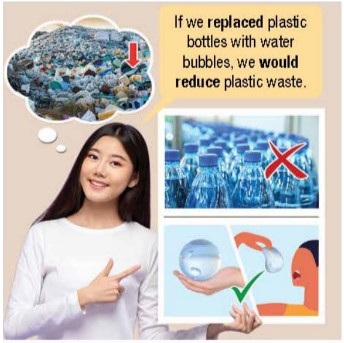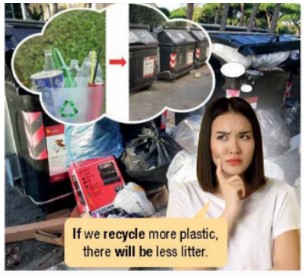Hãy nhập câu hỏi của bạn vào đây, nếu là tài khoản VIP, bạn sẽ được ưu tiên trả lời.

- What will happen if we turn off the lights?
(Điều gì sẽ xảy ra nếu chúng ta tắt đèn?)
- If we turn off the lights, we will reduce electricity.
(Nếu chúng ta tắt đèn, chúng ta sẽ giảm điện.)

Đáp án: If we had recycling machines at home, we would reduce waste.
=> Sai vì không sử dụng dạng phát âm yếu của từ "would".

,Put the verbs in brackets in their correct form
1, If we (not) don't on electricity, there will be power cuts
2, I hope he (finish) will finish his homework before we (get) get back
3, If we sit too far away from the screen I (not be) won't be able to see the film
4, Listen to those people! What langauge are they (speak) speaking?
5,It is an awful fim. It (be) is the worst film that I ever (see) have seen
6,Khanh usually (play) plays football with his friends after school, but yesterday he (not play ) didn't play as he was tired
7,After three days of rain, I'm glad the sun (shine) shines again today
8, ___ I know from my experience that (gain)___ a good knowledge of a foreign language, one must work hard at it every day.
9, I (repaint) repainted the walls. They lock great! The room (be) is much lighter now.
10, Someone (steal) will steal your car if you leave it unlicked
11, If he (wash) washes my car , I'll give him $10
12, They'll be very angry if she (make) makes any more mistakes
13, If you are late, they (not let) won't let you in.
14, If lend you $10, when will you (repay) repay me?
15, If I find your passport, I (telephone) will telephone you at once
16,He will ruin his eyes if he (read) reads in bad light
17, If I tell you a secrect, will you (promise) promise not to tell it to anyone else?
18, If I see him, I (give) will get him a lift
19, If he (be) is late, we'll go without him
2,Give the correct form of the words in brackets to finish the letter
Dear Kay,
Isabella and I are having the (good) best holiday of our life! We are in Vinabliss Resort, one of the (lovely) most lovely islands in the Eastern Sea. Although it is much (small) smaller than Vinaland, there seems to be (much) more to do than in Vinaland. Moreover, the people here seem to be (friendly) more friendly than those on other islands. We are staying in the (moden) more modern hotel I have ever seen. It is far(comfortable) more comfortable than any other and it is even (big) bigger than the world-famous Calton hotel .The (near) nearest beach is (little) less than a hundred metres away, so we can swimin a lot. It's really good and I want you to be here with us.
Love,
Maltida
3,Choose a suitable word from the box put in each blank to finish the passage
| from | means | in | waste | possible |
| wind | should | green | However | who |
Much of our waste, especially waste (1) from factories, electric-poweres stations, the chemica indusrty and heavy industry, is very dangerous. Fish die (2) in the lakes, rivers and seas; forest trees die, too. Much of this dangerous (3) waste goes into the air and is carried by the (4) wind for great distances.
The Earth is our home. We (5) should take care of it, for ourselves, and for our children and grandchidren. This (6) means we have to keep our enviroment (7) green and clean. The importance of this task is pointed out by ecologists-the scientists (8) who study the relations between living things and the enviroment . (9) However , each of us must do everything (10) possible to keep the land, air and water clean
| trees | metal | protect | damage | recycle | enviroment |
| danger | rubbish | save | animals |
11, Some factories recycle empty bottles and cans
12,We shouldn't damage forests.
13, It's important to save our skin from harmful effects from the sun
14, Metal, paper and glass can recycle
15, We should plant more trees in our city
16, We have to do everything to protect the environment
17, Some animals in the world are in danger now
18, Don't throw rubbish in the streets
19, People are doing a lot of things to damage the environment
20, We are destroying wild animals and plants
4, Join the pairs of sentences, using the suggestions given in brackets
1, I must ring john. i won't forget, I hope.(I hope I....)
=> I hope I won't forget to ring John
2, His uncle helped him. He was able to finish his course.(Because....)
=> Because his uuncle helped him, he was able to finish his course
3,I think we should go ahead. No one disapproves of the plan.(As..)
=> As no one disapproves of the plan , we should go ahead
4, It was raining heavily. They continued to play tennis. (Although ...)
=> Although it was raining heavily , they continued to play tennis
5, "Ambulance" is written backwawrds. You can read it in the mirror (....so....)
=> "Ambulance" is written backwawrds so you can read it in the mirror






